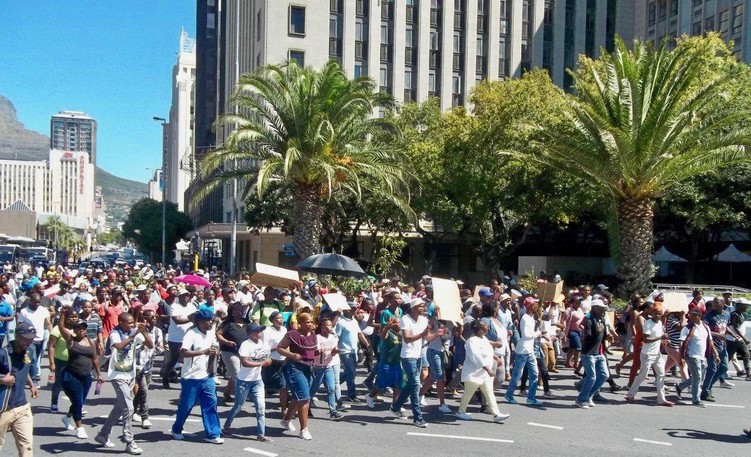Cape Town shack dwellers march for RDP houses
“As long as each family has a tap, a toilet, and a box of electricity, we will be happy.”
Hundreds of people from informal settlements around Mfuleni marched to the Western Cape Department of Human Settlements and the Civic Centre in Cape Town on Thursday.
The protesting residents came from Sophia Town, Sondela, Nyakathisa, Strong Yard, Constantia and Mseleni. They sang: “We swear [MEC for Human Settlements Bonginkosi] Madikizela will shit”. They waved placards that read: “No water. No toilet. No electricity” and “We are tired of Madikizela’s empty promises”.
Luvo Nontshuda, president of Qina Mhlali (meaning “Resident be strong”), the organisation that led the march, said, “We want residents and backyarders to be relocated to RDP houses and temporary houses or serviced sites where they can have their own plots.”
“As long as each family has a tap, a toilet, and a box of electricity, we will be happy,” he said.
He said Qina Mhlali leaders had met with Madikizela in October last year and again in February. “He promised us that residents staying in informal settlements and backyarders would be moved to plots located in Fairdale and New Beginning in Mfuleni. We are angry now because he has failed to honour his promise.”
Nontshuda said the City and the provincial government had been making lists of backyarders since 2016, but had failed to provide serviced sites.
“If the City doesn’t relocate us or respond to our demands, we will occupy land in Fairdale and New Beginning,” said Nontshuda.
He said they were living in unbearable conditions with shacks in wetlands, near sewage pipes and storm water drains. They live without toilets, electricity or taps.
“If the City had installed electricity in our informal settlements, we would buy it,” he said. “In Sondela informal settlement, where I stay, we are about 300 but we have only five taps.”
Andile Tebekwana, chairperson of Qina Mhlali, said, “I don’t even feel inclined to hand over the memorandum to the department because I know it’s a waste of time.”
Community Liaison Officer Xolile Joja and Khayalakhe Nontshiza received the memorandum for the city and provincial governments.
Nyakathisa community leader Siphokazi Fatyela said people had to use illegal connections for electricity from street lights which were very dangerous when it rained. “We live by God’s mercy here,” she said.
Strong Yard community leader Noluvo Mkrola, who is pregnant, said, “I’m scared that winter is about to set in. Our beds float on water when rain pours hard … City officials photograph us and take down our names, but they never return to give us help.” Her shack is located near a storm water drain.
“I’m going to give birth soon, but I can’t stay with an infant in a smelly and flooded shack that stays wet even after the heavy rains,” she said.
Community leader Khwezi Ndabeni, also from Nyakathisa, said, “We don’t get rubbish bags or even a container in which we can deposit rubbish. Now our place is teeming with rubbish.”
Mayco member Malusi Booi said, “The City will respond to the memorandum and this matter is receiving attention … Engagements with affected residents and communities continue.”
GroundUp was unable to get comment from Madikizela at the time of publication.
© 2019 GroundUp.
This article is licensed under a Creative Commons Attribution-NoDerivatives 4.0 International License.
You may republish this article, so long as you credit the authors and GroundUp, and do not change the text. Please include a link back to the original article.



